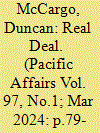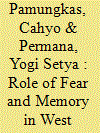|
|
|
Sort Order |
|
|
|
Items / Page
|
|
|
|
|
|
|
| Srl | Item |
| 1 |
ID:
193643


|
|
|
|
|
| Summary/Abstract |
The Move Forward Party’s victory in Thailand’s 14 May 2566 (2023 CE) election surprised most observers, defying widespread predictions of a Pheu Thai win. Departing from traditional vote-mobilization strategies, Move Forward’s campaign focused largely on social media and broad calls for political reform while eschewing the vote-canvassing networks and economic policy promises that had delivered victory after victory for Pheu Thai. Does Move Forward’s win indicate changes in Thai voting behaviour? Relying on data from an original survey collected the week before and the week after the election, as well as observations from fieldwork, we identify two political cleavages that were influential in shaping vote choice: age and ideology. Younger voters and those who embrace more liberal values were significantly more likely to support Move Forward. Nevertheless, we caution that this election may be unique, and that these political cleavages may not necessarily drive voter behaviour in future elections.
|
|
|
|
|
|
|
|
|
|
|
|
|
|
|
|
| 2 |
ID:
193641


|
|
|
|
|
| Summary/Abstract |
Thailand’s 2023 election outcome did not correspond with the results: the Move Forward Party “won” the polls, but runner-up Pheu Thai ended up forming the government. How could this have happened? This article offers two explanations. First, results and outcomes have typically differed in recent Thai elections: in itself, the substitution of Pheu Thai for Move Forward was nothing unusual. Second, in 2023 an elite pact was in place to ensure that Pheu Thai and the country’s conservative elite could engage in a form of promiscuous power-sharing following the May 14 polls. The article explains the politics behind this deal-making, and argues that the creation of the Srettha Thavisin government may not have been an accidental electoral outcome, but could have formed part of a deliberate strategy by the Thai establishment.
|
|
|
|
|
|
|
|
|
|
|
|
|
|
|
|
| 3 |
ID:
193640


|
|
|
|
|
| Summary/Abstract |
In the West Papua conflict, fear fuels both Papuan ethnonationalist and Indonesian nationalist sentiment. We argue that this reciprocal fear and memoria passionis plays a significant role in fuelling political violence. On the one hand, it provokes Papuan activists to respond violently to Indonesian military operations. Fear of losing future generations of indigenous Papuans has strengthened their identity as Papuans and encouraged them to join armed movements against Indonesia. On the other hand, fear of West Papuan independence leads the Indonesian military and police to conduct operations against members of the Free Papua Movement and affiliated groups and other activists not in the independence movement. This results in a “reciprocal fear-fuelled nationalism,” whereby Indonesian security forces and Papuan separatist activists are drawn into increasing conflict. In this context, fear becomes institutionalized and socially constructed. By understanding the unending violent conflict in Tanah Papua as related to the transfer of emotions across generations, it becomes clear a military operations approach will not be effective in the long term. Non-violent approaches, especially dialogue with separatist groups, will be more effective in breaking the chain of violent memories, resulting in more positive outcomes for conflict resolution in Papua. Learning from negotiations between the government of Indonesia and the Free Aceh Movement in 2005, we support the proposition that dialogue is the best entry point by which to end this prolonged separatist armed conflict.
|
|
|
|
|
|
|
|
|
|
|
|
|
|
|
|
| 4 |
ID:
193642


|
|
|
|
|
| Summary/Abstract |
This article argues that Thailand’s 2023 parliamentary election was the first election where social media played a decisive factor in the electoral outcomes. Prior to this election, social media was an important campaign tool, but it was unclear whether it made a difference in the electoral results. Based on our original post-election survey data (n = 1,249), social media was the most important media in governing vote choice. Social media was a crucial space for activation and conversion—motivating the undecided to become partisans and converting partisan voters to shift their allegiances. Thailand’s 2023 election was also marked by rising personalization of political campaigning, wherein citizens felt free to decide how and what their political participation would look like, and parties that encouraged inclusive and open engagement with politics were best poised to win in the electoral arena. Drawing on social network analysis of social media data, this article demonstrates how the Move Forward Party’s (MFP) loosely structured and inclusive social media campaigns allowed both their candidates and supporters to mobilize individualized large-scale collective action, in contrast to their rivals who focused on traditional top-down style campaigning. Despite the MFP’s winning social media campaigning that produced electoral victories, the party was unable to come to power due to an entrenched authoritarian political system designed to maintain the power of the country’s autocratic elites. The Thai case demonstrates powerfully how autocrats might lose an election due to social media, but still manage to hang on to power through entrenched authoritarian institutions.
|
|
|
|
|
|
|
|
|
|
|
|
|
|
|
|
| 5 |
ID:
193638


|
|
|
|
|
| Summary/Abstract |
It is widely noted that China maintains a “special relationship” with North Korea, which is best epitomized by the Sino-DPRK Treaty of Friendship, Cooperation and Mutual Assistance that the two countries signed in July 1961. However, in the post-Cold War era, the raison d’être of this alliance treaty has been challenged. Against this backdrop, this paper traces China’s evolving interpretations of the Sino-DPRK friendship treaty. By investigating the process behind the signing of the treaty, it argues that Beijing signed an “alliance treaty” with Pyongyang to win over the latter in the context of the Sino-Soviet split. However, as China sought to improve its relations with Western powers, the Sino-DPRK friendship treaty became increasingly burdensome to Beijing. Thus, Beijing began to dilute the alliance nature of the treaty by no longer publicly affirming its security obligation toward Pyongyang. After Deng Xiaoping came to power in China, the treaty was found to be incompatible with Beijing’s newly promulgated foreign policy principle of non-alignment. To address this problem, Beijing ultimately reformulated the nature of Sino-DPRK relations and reinterpreted the Sino-DPRK friendship treaty—that is, China is not an ally of North Korea, and the Sino-DPRK friendship treaty carries only symbolic meaning without casus foederis. Based on these analyses, this paper claims that the security obligation of the Sino-DPRK friendship treaty is no longer functional.
|
|
|
|
|
|
|
|
|
|
|
|
|
|
|
|
|
|
|
|
|